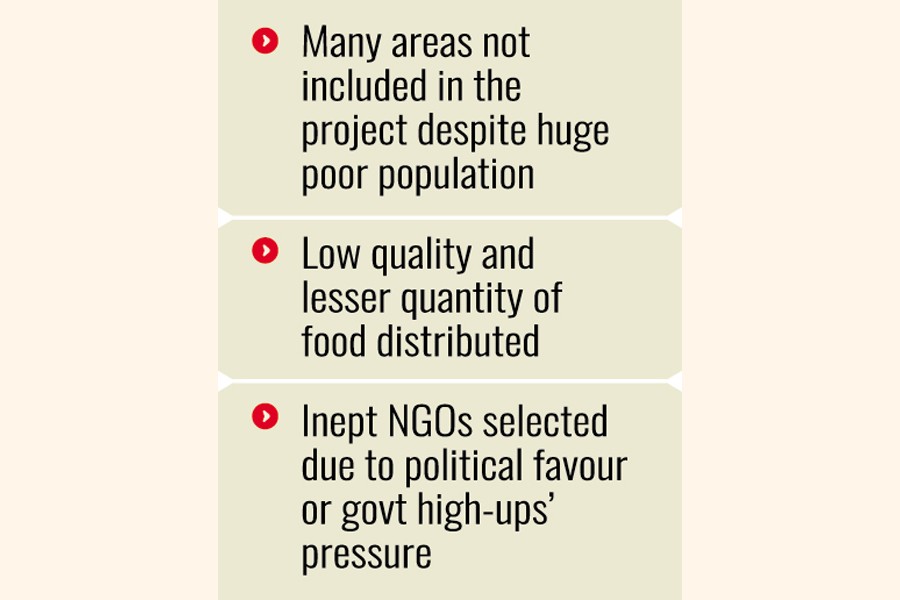
Published :
Updated :

Various irregularities and large-scale malfunction have been found in the Department of Primary Education's (DPE) mid-day meal distribution programme in 35 districts across the country, insiders said.
Distribution of low quality and lesser quantity of food in the targeted areas, and inappropriate selection of target vicinity for the school feeding programme were detected by the Implementation Monitoring and Evaluation Division (IMED).
Despite significant proportion of poverty-stricken population, many areas were not incorporated in the project. Many incompetent NGOs, responsible for food supply under it, were selected following political consideration or under pressure from the government high-ups, an impact evaluation report of the IMED said.
According to the report, work of the selected NGOs lacked transparency. It was not possible to bring those NGOs under an accountability mechanism even at the last stage of the project.
In addition, various financial irregularities, including disbursement and payment without proper documents as well as discrepancies in financial accounts, were also found.
"Some 36 per cent of all the targeted areas have not been provided with food. Low-quality food has been distributed in many areas," the report said.
The IMED evaluation team could not detect two luxury jeeps and two micro-buses, purchased for the project, as those were not submitted to the Government Transport Pool.
The IMED prepares impact assessment report after completion of a project - to verify whether the project's value objectives have been achieved or not, or how positive role it has played in the beneficiaries' lives.
The DPE, under the Ministry of Primary and Mass Education, undertook the 'School Feeding Programme in Poverty-Stricken Areas' in 2010 with an aim of providing mid-day meal to some 3.23 million poor primary-level students.
The programme was implemented in 104 upazilas of 35 districts. It was supposed to be completed in 2014, but was later extended up to 2022.
The initial project cost was Tk 11.43 billion, which was finally revised upward to 49.92 billion, 337 per cent higher than the original allocation. During the implementation period, a total of four PDs, three full-time and one additional, was appointed.
The DPE project's assessment report was prepared by House of Consultants (HCS) on behalf of the IMED - based on various stages of data verification, and interviews with local beneficiaries, administration and stakeholders. The report was recently finalised.
As per the IMED review, the financial irregularities in the project included revenue loss, overpayment, disbursement and payment without documents, and discrepancies in financial accounts.
"There was lack of transparency in the vendor or supplier selection as well as tender invitation and evaluation processes. Due to these, certain vendors, which were not competitive, got the work."
In many cases, more importance was given to the lowest price than the vendors' experience, which affected the food quality. Due to lack of accountability of the vendors, it was not possible to deliver food on time in many cases.
Besides, no internal audit was conducted during the entire project, and no explanation was given in this regard, the IMED noted.
The Project Completion Report (PCR) showed that irregular expenditure was made by showing fake task reports and delivery invoices for the 2016-17 fiscal year.
"The project's main expenditure was purchase of biscuits. No information was given in the project completion report about how biscuits were distributed among the schools."
The IMED evaluation found that 63.69 per cent of the students received biscuits as required, and the rest did not receive properly.
However, Project Director (PD) Md Ruhul Amin, who served for the last one and a half years, said none of the IMED's allegations was true.
"All the children, who attended schools in the project areas, received food. The World Food Programme (WFP) controlled the quality of food distributed among them. It was ensured through verification of the Bangladesh Council for Scientific and Industrial Research (BCSIR). The WFP selected the NGOs."
When asked about the vehicles, missing after the project completion in 2022, Mr Amin said all the vehicles were submitted to the DPE at the end of the programme. "No irregularities have been committed anywhere. The completed project report has also been submitted to the DPE."
An assistant PD said the project period was extended three times in view of satisfactory performance.
"The IMED cannot avoid the responsibility of the irregularities in the project, if any. If the irregularities, it is talking about now, were mentioned during the implementation period, the project's duration would not have been extended. There would have been no scope for the irregularities they are talking about," he added.
When asked about these issues, IMED Secretary Md. Kamal Uddin said the project was completed before he took the office. Therefore, he cannot say anything about its implementation weaknesses.
However, the IMED is working to divide the ongoing projects into three categories, so that in future the weaknesses of a project can be identified from its implementation stage, he added.


 For all latest news, follow The Financial Express Google News channel.
For all latest news, follow The Financial Express Google News channel.